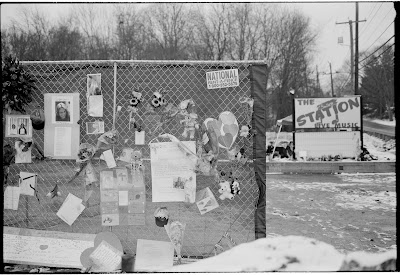I'm taking part in this years Ten Most Endangered Properties Photography Exhibit
Sponsored by the Providence Preservation Society
Opening Reception, November 8
The Providence Preservation Society’s (PPS) highly acclaimed annual Ten Most Endangered Properties Photography Exhibit will appear November 8 – 29 at the Brick School House located at 24 Meeting Street, Providence. The show features the work of photographers Jan Armor, Jesse Burke, John Caserta, Michael Cevoli, Stephanie Ewens, Erik Gould, Heidi Gumula, Deborah Hickey, Tim Hiebert, Frank Mullin, and Traer Scott.
I photographed the closed florist shop and greenhouse at 398 Hope Street Providence.
http://www.ppsri.org/
Monday, November 5, 2012
Wednesday, February 29, 2012
9 years on
Last week was the 9th anniversary of the Station nightclub fire. On the evening of February 20, 2003 during a performance by the band Great White pyrotechnics ignited a fire that quickly destroyed the entire nightclub, claiming the lives of 100 people and injuring many more. I had never been there and I didn't know anyone who died that night but still I felt compelled to go there First of March I went to West Warwick and found the site. What was left of the nightclub, which was just a small wood framed structure, had been fenced off and the fence had become a makeshift memorial shrine. Flowers, notes, stuffed animals and photographs covered almost every surface. A neat row of crosses had been arraigned on one end. An early morning snow had turned to a cold rain, the light was grey. A few people walked about or stood in silence, stopping to read a note, sometimes adding something of their own. I've never felt such overwhelming sadness at a place. I walked the fence reading names, looking at faces in pictures. Ordinary faces in everyday snapshots, simple pictures now imbued with pathos.
 I was reaching my limit, aware that what ever I was feeling was nothing
compared to what others there that morning were confronting. I had my
camera and gave my self a little distance with the photographic
exercise. I shot one roll, just 8 exposures, recording simply the visual
facts before me. I then returned to my car and broke down in tears,
crying most of the way back to home. I was sad but I could leave and
return to my wife, my life would continue on as it has. Not everybody
was so lucky. 2 days later I developed the film, sleeved the negatives
and made a contact sheet. All of which I filed away until now.
I was reaching my limit, aware that what ever I was feeling was nothing
compared to what others there that morning were confronting. I had my
camera and gave my self a little distance with the photographic
exercise. I shot one roll, just 8 exposures, recording simply the visual
facts before me. I then returned to my car and broke down in tears,
crying most of the way back to home. I was sad but I could leave and
return to my wife, my life would continue on as it has. Not everybody
was so lucky. 2 days later I developed the film, sleeved the negatives
and made a contact sheet. All of which I filed away until now. Station nightclub wiki
Monday, February 27, 2012
Digging up a really bad idea

2008_ 013, a photo by e_pics on Flickr.
This sounds pretty stupid, even for TV. Robert O. Jones forwarded me this email from Ted Sanderson at the RI Historical Preservation & Heritage Commission:
"NEWS "Savage" Archaeology Loots History on Spike TV
2/24/2012
Setting a terrible example, Spike TV has announced a new television
program: "American Digger" that "follows the American Savage team, led
by former professional wrestler-turned-modern- day relic hunter Ric
Savage as they scour target-rich areas, such as battlefields and
historic sites, in hopes of striking it rich by unearthing and selling
rare pieces of American history."
In a press release, Spike TV says: "In the US, there are millions of
historical relics buried in backyards just waiting to be discovered and
turned into profit. “American Digger” hopes to claim a piece of that
pie as the series travels to a different city each week, searching for
high-value artifacts and relics. After pinpointing historical locations,
Savage’s first task is to convince reluctant homeowners to let his
team dig up their property using state-of-the-art metal detectors and
heavy-duty excavation equipment. The team will then sell any artifacts
found for a substantial profit."
As described, this TV program is wrong on so many levels. In some
jurisdictions, the actions described may be illegal if the land is
publicly-owned or regulated. In every case, digging up artifacts
removes them from the historical context in which they have meaning,
potentially destroys significant archaeological sites, and treating
artifacts as saleable commodities de-values the heritage we all share.
Beyond deploring what is essentially historical vandalism,
preservationists should be alert to "copy cat" diggers who may try to
search for artifacts and relics at historic properties without
permission. RIHPHC will be interested to receive information about any
artifact digging in Rhode Island."
Robert adds:
"I am utterly appalled by this.
I will draft a rebuttal immediately (as a citizen acquainted with proper archaeological procedures and artifact protection law).
Is the preservation community organizing counter-measures? NTHP should be all over this.
As soon as advertisers are identified, I will write them too . . . apparently this can prove very effective.
The implication that stealing (yes, stealing) artifacts & relics is a way to memorialize and show reverence for the past is both stupid and arrogant.
These Neanderthals just want to line their pockets with filthy lucre."
Here is a link to the Spike TV press release.
Subscribe to:
Comments (Atom)





